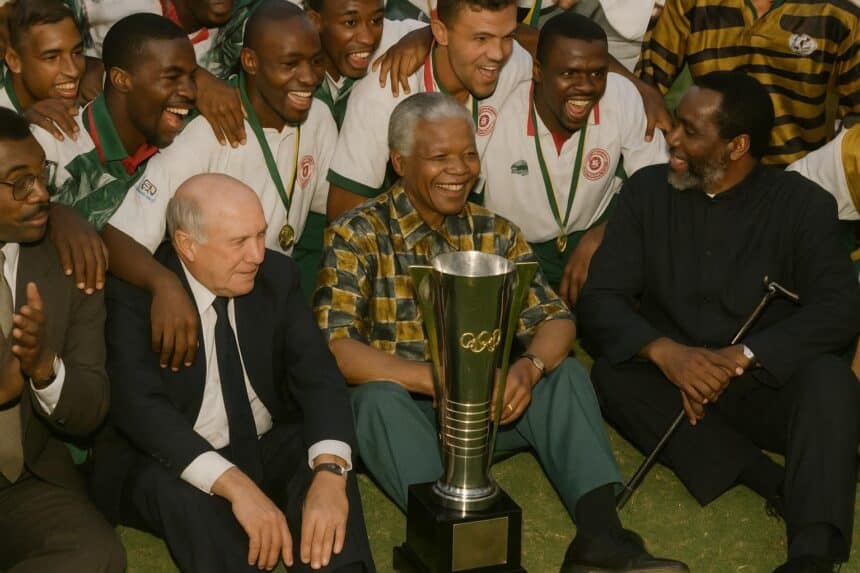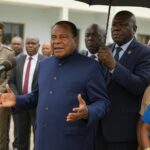Khartoum to Abidjan: 68 years of drama
In February 1957, three pioneering teams gathered in Khartoum under a desert sun and kicked off what would become Africa’s greatest sporting festival: the Africa Cup of Nations. Few outside the continent noticed, yet ten thousand fans sensed history in motion.
Sixty-eight years later, the tournament commands global audiences, prime-time slots and hashtags in multiple languages. From the black-and-white broadcast of Sudan 1970 to the ultra-high-definition fireworks of Côte d’Ivoire 2024, its evolution mirrors Africa’s own social and digital leap.
Yet one constant endures: emotion. Whether Ghana’s independence-era triumph in 1963, South Africa’s joyful return in 1996, or Senegal’s cathartic first trophy in 2021, the CAN has doubled as a political heartbeat, a football carnival and a unifying family gathering.
Icons in front of goal
Ask any street footballer in Brazzaville to list his idols, Samuel Eto’o tops the conversation before the ball stops rolling. With 18 tournament goals between 2000 and 2010, the Cameroonian striker set a mark that even Mohamed Salah still chases.
Back in the late sixties, Ivorian forward Laurent Pokou scored at will, including five against Ethiopia in 1970, a single-match feat never equalled. ‘Defenders thought he was dancing,’ recalls former teammate Eustache Manglé, half amused, half awed by the memory.
The list of sharpshooters is long—Pierre Ndaye Mulamba’s nine in 1974, Riyad Mahrez’s stoppage-time rocket in 2019—but it is the blend of flair, urgency and crowd noise that forges an instant legend and lights up living rooms from Pointe-Noire to Paris.
Tacticians at the touchline
Behind every celebration stands a coach fiddling with magnets and nerves. Egyptian mastermind Hassan Shehata lifted three consecutive titles between 2006 and 2010, his calm demeanour on the bench mirrored by a nation on a record 19-match unbeaten run.
Ghana’s Charles K. Gyamfi set the earlier standard with three trophies of his own, while French adventurer Claude Le Roy clocked up nine finals appearances, criss-crossing the continent like a musical act on tour and earning the nickname ‘White Sorcerer’ from Gabonese fans.
Modern analysts also salute Hervé Renard, the first to win with two different nations, Zambia in 2012 and Côte d’Ivoire in 2015. ‘He made us believe we could touch the sky,’ remembers former Chipolopolo keeper Kennedy Mweene, still shaking his head.
Golden shirts of the continent
Egypt remain the tournament’s gold standard with seven trophies, their red jerseys now shorthand for efficiency on African nights. Close behind, Cameroon have five, powered by generations from Roger Milla to Vincent Aboubakar who dance and deliver in equal measure.
Ghana, Nigeria and Côte d’Ivoire each built golden generations that turned finals into epic miniseries. The Elephants’ penalty-shoot-out dramas in 1992, 2006 and 2015 still circulate on DVD stalls across the region, a reminder that heartbreak can age into folklore.
Closer to home, fans still cherish Congo-Brazzaville’s lone triumph of 1972, a 3-2 victory over Mali that coloured an entire decade red and green. ‘Our fathers retell it like gospel,’ laughs accountant Florent Loubaki, who was born twenty years later.
Records that refuse to fall
Some figures feel carved in granite: Egypt’s 19-game unbeaten streak, Ayman Mansour’s 23-second opener in 1994 and the 120-000 crowd that packed Cairo’s stadium for the 1986 final. Each statistic doubles as a postcard from a specific African afternoon.
Fans addicted to drama point to 2006, when Côte d’Ivoire edged Cameroon 12-11 on penalties, every kick ratcheting up the volume in makeshift viewing centres from Kinshasa to London. Commentator Didier Roustan simply whispered, ‘This is madness,’ as silence fell.
The most attacking edition arrived only months ago: 119 goals in 2023’s competition played in early 2024. ‘Defenders had no chance with VAR and extra added time,’ jokes CAF statistician Nouredine Bakhit, hinting that modern tweaks may keep scoreboards rattling.
Television directors also chase numbers. The 2024 final drew an estimated 90-million cumulative viewers worldwide, according to CAF’s media rights report, dwarfing early editions filmed with a single camera. Streaming platforms note spikes of up to 400 % in Congo during decisive shoot-outs.
Advertisers followed, pumping jingles that now echo beyond the final whistle.
Eyes on Morocco 2025
Next stop is Morocco for the 35th instalment, already trending across Congolese social networks under the hashtag #AtlasCAN. All 24 qualified teams have previous experience, promising a tournament high on revenge stories rather than fairy-tale debuts.
Ticket prices, transport links between Casablanca and Agadir, and the December weather window dominate barber-shop debates from Oyo to Dolisie. ‘We need night matches; heat is brutal,’ says Mbemba Okombi, a bus driver saving for the overland journey.
On the pitch, bookmakers lean toward a resurgent Nigeria, yet few dare dismiss holders Côte d’Ivoire or record champions Egypt. What no one doubts, however, is that another chapter of noise, colour and late-night horns will soon be written.





















